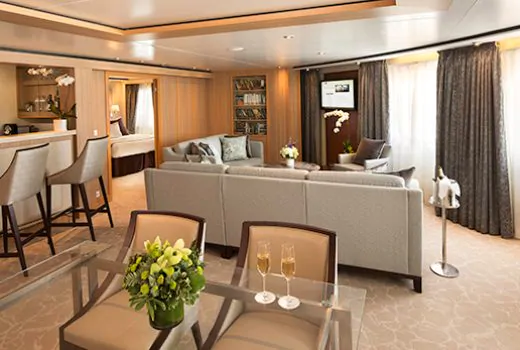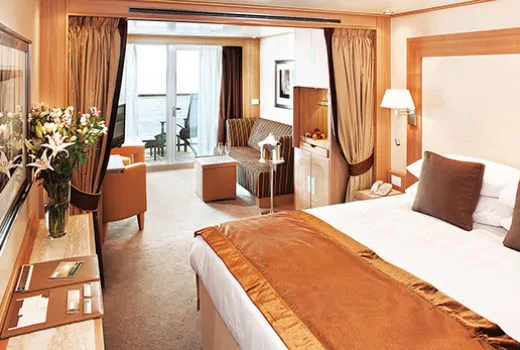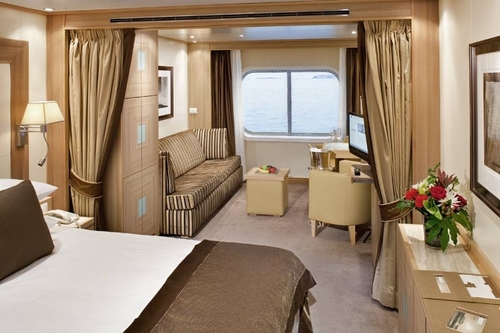Morocco & Mediterranean Gems
- 20 Jun ‘26
- 28 nights
- Departing from Lisbon
- Seabourn Sojourn
-
Inside price fromCall for price
-
Outside price from$21,199*/pp
-
Balcony price from$24,299*/pp
-
Suite price from$43,199*/pp
YOUR ITINERARY
Lisbon, Portugal - Portimao (Algarve) - Portugal - Tangier, Morocco - Motril, Spain - Cartagena, Spain - La Ciotat - Cannes, France - Monte Carlo, Monaco - Portoferraio, Italy - Portovenere, Italy - Nice, France - Marseille (Provence), France - Marseille (Provence), France - Sete, France - Rosas (Roses), Spain - Palamos, Spain - Barcelona, Spain - Palma de Mallorca, Spain - Mahon, Spain - Valletta, Malta - Mgarr (Victoria), Malta - La Goullette, Tunisia - Cagliari, Sardinia, Italy - Olbia, Sardinia, Italy - Bonifacio, Corsica, France - Civitavecchia (Rome), Italy
The great period of “the Discoveries”...
The great period of “the Discoveries” accounted for phenomenal wealth brought back from India, Africa and Brazil by the great Portuguese navigators. Gold, jewels, ivory, porcelain and spices helped finance grand new buildings and impressive monuments in Lisbon, the country’s capital city. As you sail up the Tagus River, be on deck to admire Lisbon’s panorama and see some of the great monuments lining the river. Lisbon is one of Europe’s smallest capital cities but considered by many visitors to be one of the most likeable. Spread over a string of seven hills, the city offers a variety of faces, including a refreshing no-frills simplicity reflected in the people as they go unhurriedly through their day enjoying a hearty and delicious cuisine accompanied by the country’s excellent wines.
Portugal’s southeast coast is a ruggedly beautif...
Portugal’s southeast coast is a ruggedly beautiful region, crowned by Cape St. Vincent, the southeastern-most point in Europe. At nearby Sagres, Henry the Navigator had his school where the most knowledgeable seamen in the world learned their craft. Standing on the high bluff overlooking the windy sea, one can imagine Columbus staring off to the west, pondering what lay beyond that blue horizon.
Situated just across the narrow Strait of Gibraltar f...
Situated just across the narrow Strait of Gibraltar from Europe, Tangier has long comprised a hybrid culture that is nearly as European as it is African. Standing atop Cap Spartel, one can gaze down on the place where the Atlantic meets the Mediterranean. The “Hollywood” district where the foreign embassies have traditionally been located reflects the European influence. But ascending the hill above the waterfront, one enters the narrow, winding alleys of the Kasbah, the city’s oldest, most Moroccan section. Down the coast, nearby Tetouan retains a nearly untouched walled medina, with sections originally occupied by Andalusian, Berber and Jewish populations. It is small enough that visitors can explore it without risking becoming lost, making it a perfect choice as a UNESCO World Heritage Site.
This city of the Mediterranean coast is the second la...
This city of the Mediterranean coast is the second largest on the so-called Costa Tropical. But for us it is the port from which to ascend the slopes of the snow-capped Sierra Nevada to the ethereal Moorish city of Granada and the astounding complex of the Alhambra, the most beautiful display of Islamic architecture in Europe. Dramatically sited overlooking the city, the walled series of halls, courts, gardens and colonnades drip with airy carving and elaborate decorative reliefs that embody the term Arabesque. The sprawling Generalife Gardens adjoining the fortress are a memorable site unto themselves. Elsewhere in Granada, the Capilla Real is a purely Spanish Gothic building, holding the marble tombs of the Reyes Catolicos Ferdinand and Isabella behind a gilded wrought-iron screen.
Founded by Carthaginians in the third century BC, this...
Founded by Carthaginians in the third century BC, this ancient Mediterranean port city exemplifies the region’s tumultuous history. Romans, Visigoths, Castilians and Moors have all left their marks. Under King Philip II, Cartagena’s naturally deep, sheltered harbor was developed into the nation’s premier naval base, a position it still enjoys today. Ancient ramparts remain, as does a lighthouse erected in Moorish times.
Cannes was founded in the 2nd century BC by a Ligurian tribe, ...
Cannes was founded in the 2nd century BC by a Ligurian tribe, and was subsequently colonized by the Romans in 154 AD. During the town’s entire history it went through a period of upheaval and desolation by war. In 1834, Lord Brougham, an English aristocrat, was so enchanted by Cannes that he decided to settle there. This marked the beginning of the town’s affluence, with luxury residences springing up to provide winter accommodations for international nobility. From 1930 onward, Cannes became a summer resort. Its local economy had traditionally relied on fishing, but was quickly replaced by tourism. Today, Cannes is best known for its world famous film festival and, for two weeks in May each year, attracts the brightest and most talented stars of the silver screen.
The Principality of Monaco is the epitome of Riviera chic. Th...
The Principality of Monaco is the epitome of Riviera chic. This tiny enclave of 370 acres surrounds a sheltered harbor that draws yachts from around the world to enjoy the beautiful scenery, mild weather and elegant casino. Glamorous Monte Carlo is one of Monaco’s four quarters, which also include La Condamine, the business district; Monaco-ville, the capital; and Fontvieille, an area built on reclaimed land. Ruled by Prince Albert II, Monaco has a population of over 32,000, of which about 16 percent are citizens, or Monégasques.
Despite its small size, the island of Elba has bee...
Despite its small size, the island of Elba has been known since the beginning of recorded history. Called Ilva by the Ligurians and Aethalia by the Greeks, Elba passed to the Etruscans and later the Romans. It was ruled by Pisa in the Middle Ages, was a haven for Barbary pirates in the 16th century and then privately owned by the powerful Medici family. The island’s most famous resident was Napoleon Bonaparte, whose first exile from France and short reign over Elba lasted from May 1814 to February 1815. During that time, Napoleon was able to improve the island by altering street plans, building new roads, modernizing agriculture and developing the iron mines.
Iron ore is still mined above the Rio Marina and then shipped from Portoferraio (Port of Iron). With a population of just over 11,000, the town is the largest of the eight on the island and is considered its capital. Geologists and gem stone collectors find Elba a treasure trove with over 150 minerals and semiprecious stones found here due to the seismic turmoil that created the island. The rich soil also produces an astonishing range of foliage and flowers aided by sun that shines almost every day of the year. Despite summer tourism, the island is largely agricultural and the ambience is quiet and relaxed, allowing the visitor to enjoy Elba’s natural charm, peaceful abundance and timeless beauty.
The Gulf of La Spezia has been so frequent a subject ...
The Gulf of La Spezia has been so frequent a subject for poets over the years – from Dante and Petrarch to Byron and Shelley – that it is often referred to as the Golfo dei Poeti. The elongated yellow and orange houses, which line the harbor stretch up the steep slope toward ancient battlements beyond. Mentioned as a landing place in Claudius Ptolemy’s “General Geography” (150 AD), today Portovenere is a resort with a friendly and relaxed atmosphere.
In 350 BCE Greeks from Marseilles founded Nice in...
In 350 BCE Greeks from Marseilles founded Nice in honor of the goddess of victory, Nike. The Romans showed little interest in this town sheltered by an amphitheater of hills. In 1388 it was incorporated into the Duchy of Savoy, then united with Sardinia, passed to France in 1712, passed back to Sardinia in 1814, and finally returned to France in 1860.
Today, Nice as it is now known, enjoys a popularity which stems from its charming setting, artistic treasures, wonderful climate and innumerable attractions.
Marseilles, France’s second-largest city afte...
Marseilles, France’s second-largest city after Paris, is an exciting, cosmopolitan port comprised of some sixteen distinct arrondissements, or neighborhoods. A large Algerian contingent calls the city home, adding its own inimitable accent. Much of the city’s oldest section, Le Panier, was destroyed by German troops during World War II, sparing only three fine old edifices, including Hotel de Ville (City Hall). Two fortresses, St.-Jean and St.-Nicolas, guard the harbor entrance, while Marseilles’s oldest church, Basilique St.-Victor, is virtually a fortress as well. This is a fine city for touring on foot, with sufficient cafes to provide refreshments along the way.
Marseilles, France’s second-largest city aft...
Marseilles, France’s second-largest city after Paris, is an exciting, cosmopolitan port comprised of some sixteen distinct arrondissements, or neighborhoods. A large Algerian contingent calls the city home, adding its own inimitable accent. Much of the city’s oldest section, Le Panier, was destroyed by German troops during World War II, sparing only three fine old edifices, including Hotel de Ville (City Hall). Two fortresses, St.-Jean and St.-Nicolas, guard the harbor entrance, while Marseilles’s oldest church, Basilique St.-Victor, is virtually a fortress as well. This is a fine city for touring on foot, with sufficient cafes to provide refreshments along the way.
The port town of Sete hugs the tiny Mont St. Clair, a...
The port town of Sete hugs the tiny Mont St. Clair, and is caught between the Mediterranean and the Bassin de Thau, a salt lake directly behind it. It is crisscrossed by numerous canals which link the lake to the sea, and connected by 12 bridges. Along the quay, renovated buildings provide a multitude of architectural details from the 18th and 19th centuries. The life of the town is found in its squares: Place Leon Blum, with its fountain and Wednesday morning flower market; Place Aristide, with its old fashioned bandstand; and Place de la Republique, with its huge retaining walls and vaulted loggias. Sete retains its historic purpose as a fishing boat haven for North African trade; the old harbor dates from the time of Louis XIV.
Founded by Greeks in the pre-Christian era, the Catalan town ...
Founded by Greeks in the pre-Christian era, the Catalan town is set on a lovely curve of beaches on Spain’s Costa Brava. It is crowned by the Castell de la Trinitat, which anchored the wall that encircled the entire town in medieval times. It was the site, until 2011, of Ferran Adria’s Michelin three-star restaurant El Bulli, which will reportedly reopen in 2014 as a culinary creativity center. Shop for a souvenir from the back of a street hawker’s donkey, or wander to nearby Figueres or Cadaques to visit one of Salvador Dali’s museums.
Located at the foot of the mountains on Spain’s r...
Located at the foot of the mountains on Spain’s rugged Costa Brava, Palamos boasts seven superb beaches, Iberian archeological remains from the year 6 BC, and the Church of Sant Esteve on the beach. Highlighting the town center is its 16th-century cathedral.
Barcelona, the capital of Catalonia, is said to have been f...
Barcelona, the capital of Catalonia, is said to have been founded by the Phoenicians, and was once the rival of the powerful states of Venice and Genoa for control of the Mediterranean trade. Today, it is Spain’s second largest city and has long rivaled, even surpassed Madrid in industry and commerce. The medieval atmosphere of the Gothic Quarter and the elegant boulevards combine to make the city one of Europe’s most beautiful. Barcelona’s active cultural life and heritage brought forth such greats as the architect Antonio Gaudi, the painter Joan Miro, and Pablo Picasso, who spent his formative years here. Other famous native Catalan artists include cellist Pau Casals, surrealist Salvador Dali, and opera singers Montserrat Caballe and Josep Carreras. Barcelona accomplished a long-cherished goal with the opportunity to host the Olympics in 1992. This big event prompted a massive building program and created a focal point of the world’s attention.
Spain’s Balearic Islands are among Europe’s most...
Spain’s Balearic Islands are among Europe’s most popular resort destinations. Mallorca is the largest and most developed of these islands. Rome and Carthage battled over this territory and portions of ancient Roman constructions still remain. Founded almost 2,100 years ago, the city of Palma de Mallorca, the island’s busy capital city boasts a considerable store of history. Mallorca welcomes its visitors to an island, which can be both exciting and tranquil. The abundant sightseeing and sunshine are yours to enjoy.
Mahon is the capital of Menorca, second largest of t...
Mahon is the capital of Menorca, second largest of the Balearic Islands. It stands out from the others because of the abundance of prehistoric structures, and because its culture was influenced by British occupation in the 18th century. The people who built the prehistoric constructions are believed to have been responsible for similar works in Sardinia, and for Stonehenge in England. Believed to have been founded by the Carthaginian General Mago, Mahon was held by the Moors from the 8th to the 13th century and in turn occupied by the English, the French and the Spanish. Mahon was finally ceded to Spain by the Treaty of Amiens in 1802.
Occupied successively by the Phoenicians, Greeks, Carth...
Occupied successively by the Phoenicians, Greeks, Carthaginians, Romans, Arabs, French and British, Malta has been of strategic importance throughout history. A British Crown Colony until 1964, Malta received the George Cross for its valiant resistance to German occupation in WWII. The island’s rich heritage is reflected in the architecture of Valletta, the current capital, and Medina, the capital until 1565. In Valletta the Knights of St. John built such masterpieces as St. John’s Co-Cathedral and the Palace of the Grand Masters, along with the fortifications that guard the town’s magnificent harbors.
A port not often visited by cruise ships, being mor...
A port not often visited by cruise ships, being more accustomed to welcoming fishing boats and private yachts. Malta’s smaller sister-isle has a lot of charm to offer. Villages such as Mgarr all boast tall, elaborately carved churches, the result of a combination of fine-grained, easily carved stone, time, and stonemasons whose skill is matched only by their religious devotion. The city of Victoria was so named to honor the British queen’s Diamond jubilee.
La Goulette, known in Arabic as Halq al-Wadi, is the port o...
La Goulette, known in Arabic as Halq al-Wadi, is the port of Tunis, the capital of Tunisia. The Kasbah fortress was built in 1535 by Charles I of Spain but was captured by the Ottoman Turks in 1574
The pleasingly green, quiet island of Sardinia offers t...
The pleasingly green, quiet island of Sardinia offers the visitor scenic beauty and a relaxed lifestyle. Cagliari, the island’s capital, features handsome Italianate architecture and several churches reflecting a variety of influences. Impressive views are provided by the city’s hillsides, with one of the best panoramas available from the old walls of Terrazzo Umberto. The island’s natural charm has attracted pleasure-seekers to the Costa Smeralda since the Aga Khan sought shelter ashore from a storm at sea.
The rugged Italian island of Sardinia is blessed with a r...
The rugged Italian island of Sardinia is blessed with a rocky coastline interrupted by soft sand beaches and washed by limpid seas. Olbia is a very ancient town. It was founded by Phoenicians, and later occupied by Greeks and Romans in their turns. The church of San Simplicio dates from the 11th or 12th century, and that dedicated to St. Paul the Apostle is medieval. The town’s Museum of Archaeology can help you visualize the timeline. Everything changed dramatically in the 1960s, when the Prince Karim Aga Khan selected a 20-kilometer stretch of the nearby coastline to develop an exclusive resort complex he called the Costa Smeralda. Today this enchanting shoreline is encrusted with jewel-like resorts and hotels, private villas and beach facilities, yacht marinas and heliports. It is reputedly the most expensive real estate per square meter in Europe. Without doubt it is beautiful, and it is not necessarily that expensive to just look.
The scented isle of Corsica, birthplace of Napoleon, was control...
The scented isle of Corsica, birthplace of Napoleon, was controlled for centuries by Genoa and did not become a region of France until 1768. As late as the last century, the rugged island was still a haven for bands of brigands. Today, the island’s inviting beaches and scenic beauty attract an increasing number of tourists hoping to escape the much more hectic pace of the Riviera. Bonifacio, perched at the top of towering white cliffs, is a striking sight from the sea. Watch for the 15th-century staircase carved into the cliff face which runs right down to the water’s edge as you approach the harbor.
Originally built by Emperor Trajan who had a villa here...
Originally built by Emperor Trajan who had a villa here, Civitavecchia has flourished as a major port for Rome since the 13th century. Today it is an important ferry terminal and for many travelers the gateway to the Eternal City, Rome. The Renaissance fortifications that surround the harbor area were begun by Bramante and completed by Michelangelo in 1535.
YOUR SHIP - The Seabourn Sojourn
Seabourn Sojourn enchants her guests with an array of public areas scaled to encourage a relaxed sociability. One of the most unusual features of Seabourn Sojourn and her sisters is Seabourn Square, an ingenious “living room” that replaces the traditional cruise ship lobby with a welcoming lounge filled with easy chairs, sofas and cocktail tables; making it more inviting and relaxing on a small ship cruise. An enclave in its center houses knowledgeable concierges discreetly seated at individual desks.
Seabourn Sojourn enchants her guests with an array of public areas scaled to encourage a relaxed sociability. One of the most unusual features of Seabourn Sojourn and her sisters is Seabourn Square, an ingenious “living room” that replaces the traditional cruise ship lobby with a welcoming lounge filled with easy chairs, sofas and cocktail tables; making it more inviting and relaxing on a small ship cruise. An enclave in its center houses knowledgeable concierges discreetly seated at individual desks.
Beauty Salon
Facial Treatments
Massage
Sauna
Spa
Swimming Pool
Thalassotherapy Pool
Whirlpool
In-Suite Service
Patio Grill
Sky Bar
The Colonnade
The Restaurant
The Restaurant 2
Gym
Sports Deck
Description
Seabourn Sojourn enchants her guests with an array of public areas scaled to encourage a relaxed sociability. One of the most unusual features of Seabourn Sojourn and her sisters is Seabourn Square, an ingenious “living room” that replaces the traditional cruise ship lobby with a welcoming lounge filled with easy chairs, sofas and cocktail tables; making it more inviting and relaxing on a small ship cruise. An enclave in its center houses knowledgeable concierges discreetly seated at individual desks.
Relaxation
Beauty Salon
Facial Treatments
Massage
Sauna
Spa
Swimming Pool
Thalassotherapy Pool
Whirlpool
Food and Drink
In-Suite Service
Patio Grill
Sky Bar
The Colonnade
The Restaurant
The Restaurant 2
Fitness
Gym
Sports Deck
STATEROOMS

suite

balcony


